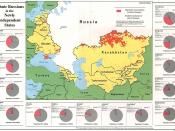In her book, Antler on the Sea, Kerttula discusses how Soviet government policies aimed to integrate the northern peoples of the USSR in reality helped the groups to maintain their identities as they defined themselves in opposition to one another. According to Kerttula, "in Sireniki, the very system that sought to control and homogenize difference reinforced it" (155). Kerttula illustrates the extent to which much of the native culture has survived the Soviet period. This trend is particularly prevalent as Kerttula progresses through her descriptions of Yup'ik, Chukchi, and 'Newcomer' lifestyle and practices. The development of collective group identity and cultural transformation among northern indigenous peoples in the Soviet Union was heavily influenced not only by the structure of the Soviet system but also by the provoking of oppositional relationships between the groups. Kerttula effortlessly explains the interrelationships of the many opposing 'forces': tundra and sea, Yup'ik and Chukchi, natives and newcomers, and old and new ways in the North.
These relationships were based on prior cultural forms, symbols and meanings but as a result of Soviet influence, local cultural boundaries were transformed and the ensuing dialogue of difference was encouraged. As Kerttula asserts, it is the "we/they dichotomy that for many anthropologists defines an ethnic group" (152).
The Soviet state, with its ideological, political and economic goals, changed the structure of the interactions between local and immigrant groups, but was unable to change the cultural content of their discourse. According to Kerttula, historically the Yup'ik, Chukchi and Russians had very limited contact with one another. Prior to forced relocations and settlements that occurred with collectivization, the Yup'ik lived at Sireniki and met with the Chukchi occasionally for the limited purpose of trade (123). After collectivization the three groups were forced to live in a single locality and...


